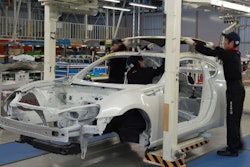Self-Healing Rubber
Tire companies for years have advertised products that could remain temporarily inflated in the event of a puncture.
But what if tires could one day simply repair themselves?
Researchers at Harvard University believe a newly developed material could make that possible.
They say their new type of rubber that can heal itself while remaining just as tough as natural rubber.
The university's School of Engineering and Applied Sciences previously developed self-healing hydrogels, which rely on water to create reversible bonds between molecules.
Their challenge was creating a reversible bond in a dry material without compromising its strength, so they created a hybrid rubber with both permanent and reversible bonds.
Those two types of bonds generally don't like to mix, but researchers developed what they called a "molecular rope" to essentially tie them together.
The result was a transparent, tough, self-healing rubber.
When stretched, the material develops small cracks that remain connected by fibrous stands, which redistribute the stress then snap back into place.
The rubber could be used in tires as well as wearable electronics and medical devices, but the concept of mixing permanent and reversible bonds could also hold promise for a wide range of additional polymers.
WHAT DO YOU THINK?
What industries stand to benefit from a commercially available, self-healing rubber? Tell us your thoughts in the comments below.
Siemens To Demo First eHighway Field Trial On Autobahn
Siemens first revealed its concept of an eHighway in 2012, and since then it’s been consistently working to develop, plan and test its brainchild. If you’re not familiar, essentially the company’s eHighway project is a design where a hybrid diesel or electric trucks could move down a stretch of road and raise a specially developed pantograph overhead to meet power lines. Once attached, the vehicle would then continue to move using only electric power.
Last year, the project debuted a live install on a small stretch of road outside of Stockholm, and now Siemens has announced it will launch the first eHighway trial in Germany along a 6 mile stretch on the autobahn.
Siemens said that, like previous tests on smaller scales, the trucks will operate on electricity when connected overhead, with the hybrid diesel engine only necessary when operating on roads without the overhead lines or leaving the eHighway altogether.
The company believes that their eHighway project could potentially be twice as energy efficient as other highway freight trucks, while also significantly reducing local air pollution. Siemens says its trial stretch of eHighway along the autobahn should be completed by the end of next year.
SO, WHAT DO YOU THINK?
What do you think of Siemens’ eHighway project? What potential pitfalls or challenges do you think Siemens will encounter?
Tweet me your thoughts @MnetNews or leave your comment in the section below.






















